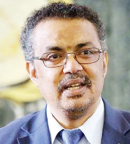On March 11, the World Health Organization (WHO) took the step it had been avoiding for weeks and declared that the spread of the coronavirus disease 2019 (COVID-19), and the virus that causes it, now identified as SARS-CoV-2, had reached global pandemic levels, the first pandemic sparked by a coronavirus. The WHO has not declared a global pandemic since 2009, when it gave that designation to a new strain of the H1N1 influenza.

Tedros Adhanom Ghebreyesus, PhD, MSc
“WHO has been assessing this outbreak around the clock, and we are deeply concerned, both by the alarming levels of spread and severity and by the alarming levels of inaction,” said WHO Director-General Tedros Adhanom Ghebreyesus, PhD, MSc, during a media briefing announcing the change in WHO’s assessment of the coronavirus outbreak from epidemic to pandemic. “We have rung the alarm bell loud and clear.”
According to WHO, in a span of just 2 weeks, the number of cases of COVID-19 outside China, where the outbreak was first identified in December 2019, had increased 13-fold to over 118,000 cases worldwide, with 4,300 deaths, and the number of affected countries had tripled to 114.1
But the extent of the outbreak is escalating at such head-spinning speed, updated data collected by the Johns Hopkins University Center for Systems Science and Engineering (CSSE) finds the global spread of the coronavirus, as of March 19, has reached 222,642 cases and resulted in 9,115 deaths in 159 countries.2
In the United States, the novel coronavirus has now infected more than 9,415 people in all 50 states and the District of Columbia, with most of the outbreaks clustered in Washington state, New York, and California, and resulted in at least 150 deaths, according to CSSE. But these numbers are expected to skyrocket into the tens of thousands and even millions as more people are tested for the coronavirus. To help blunt the spread of the virus, new guidance from the Centers for Disease Control and Prevention is calling for public gatherings to be limited to 10 people over the next 15 days.3 (For daily updates on the global spread of COVID-19, visit the CSSE website.)
Protecting Health-Care Providers and Patients
The breakneck rate of disease spread has caused response efforts to the coronavirus to transition from containment to mitigation strategies to reduce the public’s risk of contracting the virus, including calls to isolate ill people at home; closing schools, bars, restaurants, and movie theaters; and encouraging telework. President Donald Trump instituted a 30-day travel ban from 26 European countries to the United States beginning March 13; public gatherings around the country are being discouraged and even banned in many places; and major medical conferences, festivals, and sporting events in the United States and around the world are being canceled or postponed as the coronavirus continues to spread.
In the oncology community, the response has been swift to protect health-care providers and patients with cancer, who may be especially vulnerable to contracting the coronavirus because of their systemic immunosuppressive state caused by their malignancy and anticancer treatments, including chemotherapy and surgery. “We believe that patients with cancer might be at an increased risk of COVID-19 because they are immunocompromised,” said Cardinale B. Smith, MD, PhD, Associate Professor of Medicine at Mount Sinai Hospital and Director of Quality for Cancer Services at Mount Sinai Health System in New York.

“I’m telling my patients on active treatment to stay indoors as much as possible and to practice social distancing to reduce exposure to the virus.”— Cardinale B. Smith, MD, PhD
Tweet this quote
Dr. Smith continued: “We don’t have a lot of data from published studies, but an analysis from a small Chinese study of 2,007 cases of COVID-19 found that 18 cases had a history of cancer. These patients had a higher risk of severe events that required admittance to the intensive care unit, ventilation support, or that resulted in death.4 Because the number of patients with cancer in this study is so small, it is difficult to draw real conclusions from the findings, but since the virus seems to cause the highest severity of illness in older people and those with comorbidities, such as heart disease, diabetes, and lung disease, it makes sense that people with cancer are at greater risk for being infected with the coronavirus.”
To reduce the risk of infection to patients and staff members, several cancer institutions, including The University of Texas MD Anderson Cancer Center in Houston, Memorial Sloan Kettering Cancer Center in New York, and Dana-Farber Cancer Institute in Boston, have canceled all international and domestic work-related travel for meetings or conferences. And although there have not yet been any reported cases of patients with cancer infected with the coronavirus in the United States, cancer institutions are taking precautions by screening patients and visitors for the virus.
Resources for Information on COVID-19
- ASCO Answers Questions on COVID-19 Clinical Oncology: asco.org
- Centers for Disease Control and Prevention: cdc.gov
- The Journal of the American Medical Association: jamanetwork.com
- The New England Journal of Medicine: nejm.org
- U.S. Food and Drug Administration: fda.gov
- World Health Organization: who.int
“We know there is person-to-person spread of the coronavirus throughout many parts of the world and are preparing for spread in Massachusetts,” said Meghan Baker, MD, ScD, hospital epidemiologist at Dana-Farber Cancer Institute and Associate Hospital Epidemiologist at Brigham and Women’s Hospital. “We have been preparing for this outbreak since January by implementing screening protocols for patients and visitors, preparing patient flow protocols, considering personal protective equipment, and considering staffing.”
At Mount Sinai Hospital, patients on active cancer treatment receive a phone call or text message before their appointment, asking about their health and any symptoms of the virus they may be experiencing, such as coughing and shortness of breath. “We are not going to stop patients with cancer from coming through our doors, but we want to prescreen as many patients as possible before they get to the hospital and then screen them again upon entry. Anyone who exhibits symptoms will get a mask and undergo further risk assessment for COVID-19 and then receive a test for the virus if necessary,” said Dr. Smith. “I’m telling my patients on active treatment to stay indoors as much as possible and to practice social distancing to reduce exposure to the virus. We have also canceled cancer support group activity in the hospital and are instead connecting patients via teleconferencing or phone so they can still get access to support groups, just not in person.”
Currently, Mount Sinai Hospital is rescheduling routine follow-up appointments for patients with cancer who have completed active treatment at least until May to further limit risk of infection to patients and hospital staff.
The Difficulty of Stopping the Spread of the Coronavirus
Although much remains unknown about this novel strain of coronavirus, including how easily it spreads, according to the CDC, based on what is currently known about COVID-19 and other coronaviruses, spread is believed generally to occur from person to person via respiratory droplets from close contact with a person infected with the virus, although spread can also occur from contact with infected surfaces or objects. Researchers are beginning to gather some key epidemiologic features of the virus, which could have important public safety implications to mitigate the spread of the virus.
According to a recent study by Lauer et al investigating the estimated length of the incubation period of COVID-19, the evidence suggests that the median incubation period is approximately 5 days, which is similar to that for severe acute respiratory syndrome, and that patients should expect to experience symptoms within 12 days.5 The study’s results support current recommendations from the CDC to actively monitor patients for 14 days after exposure to the virus.

“The fact that individuals who are asymptomatic or who have only mild symptoms may transmit the virus makes it particularly challenging to control the spread.”— Meghan Baker, MD, ScD
Tweet this quote
However, although people infected with the coronavirus are thought to be most contagious when they exhibit symptoms, such as fever, body aches, coughing, runny nose, sore throat, and shortness of breath, there have been reports of the coronavirus spreading before people develop symptoms. “The fact that individuals who are asymptomatic or who have only mild symptoms may transmit the virus makes it particularly challenging to control the spread,” said Dr. Baker.
Preparing for Cancer Drug Shortages
Worrisome, too, is the effect the coronavirus outbreak may have on drug shortages in the United States, as pharmaceutical supply chains in China, the second-largest exporter of drugs and biologics or drugs from natural sources to the United States,6 are disrupted by the outbreak. According to the U.S. Food and Drug Administration (FDA), so far, only one drug is in short supply due to a manufacturing site affected by the outbreak, although it did not specify which drug. “We are working with the manufacturer as well as other manufacturers to mitigate the shortage. We will do everything possible to mitigate the shortage,” said a statement from Stephen M. Hahn, MD, Commissioner of Food and Drugs at the FDA.7
Fortunately, so far, cancer therapies do not appear to be impacted by the coronavirus outbreak. “Our pharmacy has been preparing for COVID-19 since we first heard about the outbreak, and we made sure to have enough medications on hand for our patients. We know that many drugs are produced in areas that have been affected by COVID-19, so we are continuing to monitor the situation,” said Dr. Baker.
Mount Sinai Hospital also currently has a full supply of drugs in its pharmacy, depending on how long the outbreak continues, but cancer drug shortages could become a problem, warned Dr. Smith. “What we are rationing right now are personal protection equipment for our staff, including gloves, surgical masks, and respirator masks, because there is a concern of a shortage of these items nationwide, so we are stockpiling our own resources to protect our staff and our patients,” said Dr. Smith.
Staying Vigilant
“The vast majority of people in the United States will not become infected with the coronavirus and will not be at risk for severe illness and complications, including patients with cancer.”— Cardinale B. Smith, MD, PhD
Tweet this quote
Although there are currently about 10 vaccine candidates under investigation to prevent COVID-19, it will likely take at least 12 to 18 months before one is approved by the FDA and ready for widespread use, according to news briefings by Anthony Fauci, MD, Director of the National Institute of Allergy and Infectious Diseases. In the meantime, there are several precautions patients with cancer can take to reduce their risk of contracting COVID-19, including getting the regular flu vaccine; avoiding contact with people who are sick; washing their hands frequently; and avoiding touching their eyes, nose, and mouth.
“I know this is a super anxiety-provoking time, but we should all remain calm,” advised Dr. Smith. “It is important to remember that the vast majority of people in the United States will not become infected with the coronavirus and will not be at risk for severe illness and complications, including patients with cancer. We all just need to remain vigilant.”
DISCLOSURE: Dr. Smith has received honoraria from Teva, has served as a consultant or advisor to Teva, and has participated in a speakers bureau for Teva. Dr. Baker reported no conflicts of interest.
REFERENCES
1. WHO Director-General’s opening remarks at the media briefing on COVID-19, March 11, 2020. Available at www.who.int/dg/speeches/detail/who-director-general-s-opening-remarks-at-the-media-briefing-on-covid-19---11-march-2020. Accessed March 17, 2020.
2. Coronavirus COVID-19 Global Cases by the Center for Systems Science and Engineering. Available at https://gisanddata.maps.arcgis.com/apps/opsdashboard/index.html#/bda7594740fd40299423467b48e9ecf6. Accessed March 17, 2020.
3. Centers for Disease Control and Prevention: Coronavirus Disease 2019 (COVID-19) in the U.S. Available at www.cdc.gov/coronavirus/2019-ncov/community/large-events/index.html. Accessed March 17, 2020.
4. Liang W, Guan W, Chen R, et al: Cancer patients in SARS-CoV-2 infection: A nationwide analysis in China. Lancet Oncol. February 14, 2020 (early release online).
5. Lauer SA, Grantz KH, Bi Q, et al: The incubation period of coronavirus disease 2019 (COVID-19) from publicly reported confirmed cases: Estimation and application. Ann Intern Med. March 10, 2020 (early release online).
6. Testimony of Mark Abdoo, Associate Commissioner for Global Policy and Strategy, U.S. Food and Drug Administration, Department of Health and Human Services. Exploring the Growing U.S. Reliance on China’s Biotech and Pharmaceutical Products. Available at https://www.fda.gov/news-events/congressional-testimony/exploring-growing-us-reliance-chinas-biotech-and-pharmaceutical-products-07312019. Accessed March 17, 2020.
7. U.S. Food and Drug Administration Statement: Coronavirus (COVID-19) Supply Chain Update. February 27, 2020. Available at www.fda.gov/news-events/press-announcements/coronavirus-covid-19-supply-chain-update. Accessed March 17, 2020.

